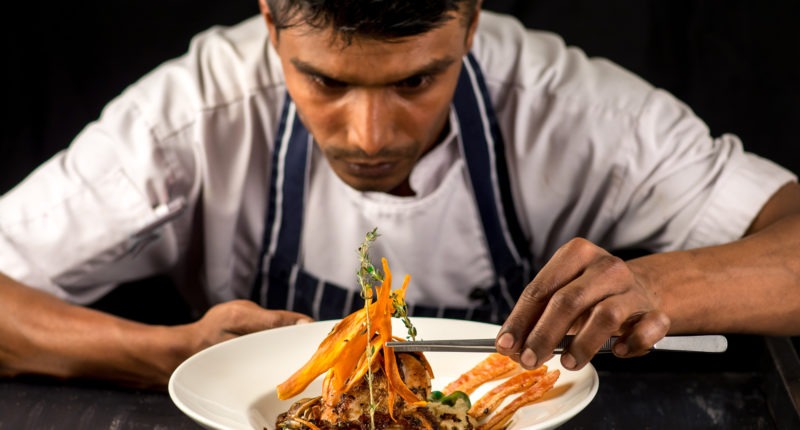The coronavirus pandemic has made a chef out of almost anyone, and people are mindful of what they eat and where it comes from. Chef Reshmi Mitra told ClearTax Chronicles that it has allowed her to discover ways to keep food modest, healthy, and how it can be transported safely from one place to the other with limited human handling. She also spoke about the changes in kitchens in terms of ingredients, safety measures, waste management, and combined dishes.
Let’s take a look at some of the questions she answered for us.
Q. In these unprecedented times, has the value of Indian spices in the kitchen risen?
Instead of being sourced from other states or the world, we are developing menus that are mainly based on local produce. For instance, consider the popular Western dish Vegetable Au Gratin, where you mix vegetables with a cream sauce, grated cheese and bake it in the oven. We have replaced the Makhani sauce with cream sauce, which is usually creamy and slightly sweet. For the right consistency, you mix it, put grated cheese and paneer on top and gratinate it. This dish is Au Gratin, but it’s Veg Makhani. We like to bite into food, as Indians, which tastes Indian but looks very Western. For instance, if you bite into an apple pie, it may not just have an apple inside; it may have Anjeer Badam Halwa instead.
Q. Is there going to be a rise in collaborative cooking to dish out magic on plates?
With regard to innovative cuisines, the kind of customers we cater to need us to be at our best in creativity. Their profiles provide an incentive to explore the potential for creativity, which is what separates us from our rivals. For instance, it is possible to turn a normal Aloo Mutter Samosa into a Chicken Fajita Samosa. You use chicken mixed with Fajita seasoning to spice the cumin dough to give the Indian cuisine a Mexican twist. You can have a samosa of this kind, but you can replace it with salsa instead of using mint chutney or tamarind chutney.
Q. In the kitchen, what are the food safety precautions taken by chefs?
When treated by as few people as possible and cooked close to the time of consumption, food is healthy. We may also use methods of flash cooking. Flash cooking requires cooking ingredients on a very high flame to seal the outer surface of the ingredient, preventing the loss of inner juices and thereby preserving the nutritional aspects of the ingredients.
Has the culture of eating out changed in India?
A Gurgaon-based restaurant, for example, offers tickets for a future five-course meal with cocktails. Others have taken to minimal deliveries for individuals. However, many are shutting them down, too, with the increasing fear of exposing the workers to infection. The human tragedy that includes all this is almost intolerable. Will we ever see the light at the end of the tunnel? What type of eating-out experiences are diners going to go back to, and what patterns are going to thrive as others die out? In the post-COVID-19 world, here’s a look at some ways in which dining as a business is likely to change:
Also Read: 7 Gadgets and Accessories You Need for a Hassle-free WFH Experience
Increase in premium deliveries: Though right before the epidemic struck, the brick and mortar restaurant industry was struggling, and delivery services were on an upswing. The millennial and Gen Z consumers displayed preferences is not only affordable meals but also in superior “experiences”. In Mumbai and New Delhi, where top chefs and restaurateurs vowed to provide higher quality food cooked in cloud kitchens and delivered to the comfort of homes, the most recent phenomenon was the advent of chef-led delivery brands. When the novel coronavirus retreats, this pattern is likely to pick up. This means lower costs per square foot and more business, and chefs and restaurateurs will be looking to capitalise on it.
End of social dining: Social dining was one of the nicest trends emerging in India, where shared tables in restaurants and bars attempted to create bonds over food and drink between strangers. This experiment is likely to be nipped in the bud after the quarantine. Politically and economically, the world may be leaning towards more barriers or reciprocal cooperation. Still, deep-seated cultural biases regarding dining with others’ are likely to be intensified when it comes to food in India.
Cooking at home: Every tragedy takes the seeds of opportunity with it. Slow food, as something to be enjoyed and produced in customised ways, maybe of renewed interest. People are also showing great interest in sharing social media recipes, cooking tips and pictures of home-cooked meals. To build companies, this can be harnessed.
Cleaner, but not cheaper food: The price-sensitive customers may finally become more conscious do ingredients grown in healthy and sustainable ways, cooked by well-trained workers and served under hygienic conditions. This means that the cost of food in a restaurant will go up, and it could be more difficult for restaurants to compete on price alone. In reality, many restaurants may shut down as individuals tighten their belts, reduce discretionary spending and reduce the frequency of eating out. However, they may eat at quality restaurants rather than a cheap Chinese outlet when they eat out.
Food was not meant to be comforting at the rarefied restaurants. However, in a world ravaged by disease and devastation, comfort is what diners will seek from every experience. As we begin to move out of our homes, on such a high table, we may find ourselves seated soon.
For any clarifications/feedback on the topic, please contact the writer at sujaini.biswas@cleartax.in

An Editor by day and a sloth by night…I would love to eat and sleep throughout the day if given a chance…I enjoy reading and love my job and my team at ClearTax.





